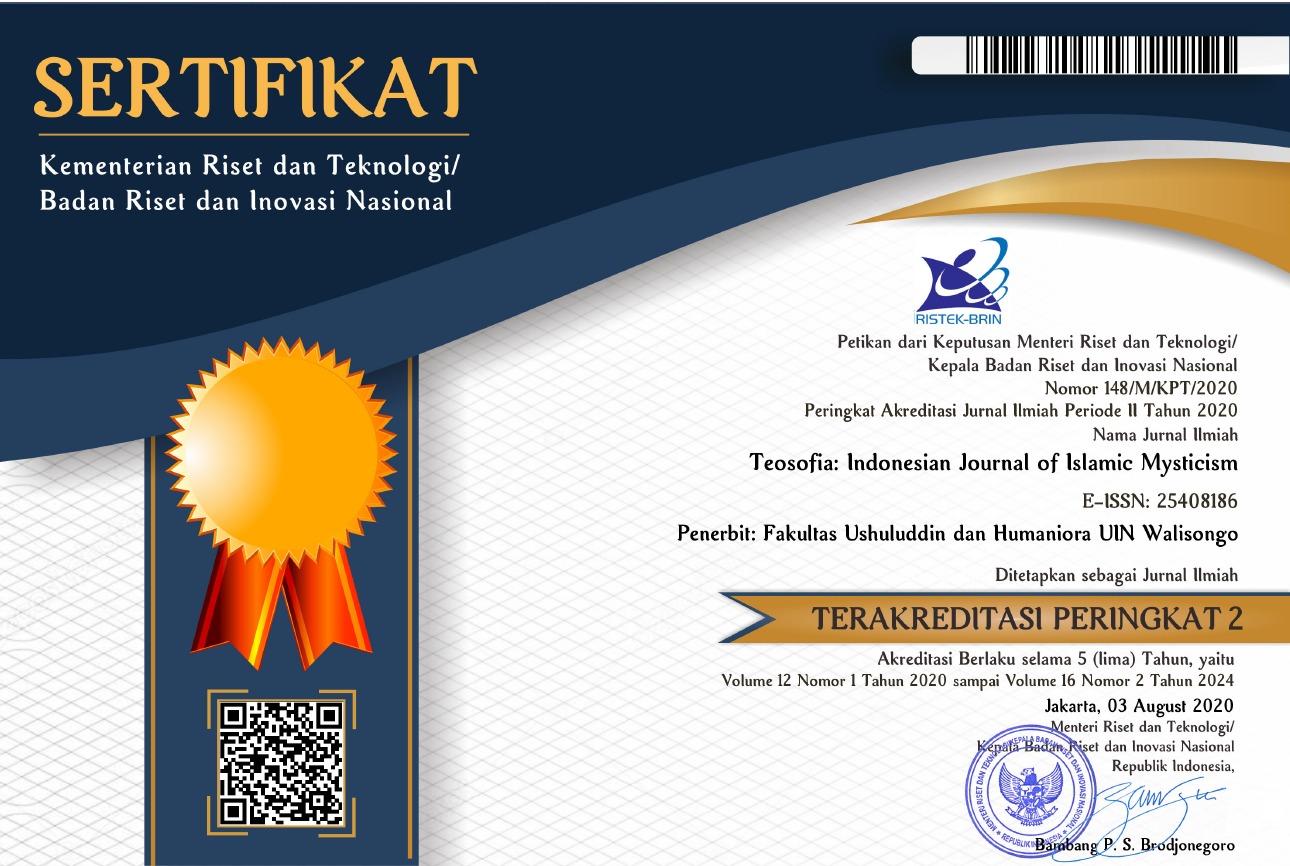An Examination of Socio-Religious Practices of Sufi Adherents in Bida, Niger State
DOI:
https://doi.org/10.21580/tos.v12i2.17449Keywords:
Bida, Nupe Land, Nigeria, Sufi, socio-religious practicesAbstract
Sufis were known to have contributed to spreading Islam across the world. This paper seeks to encapsulate the early religious belief of the Nupe people in Bida, Niger state, until the introduction of Islam by the Sufis. The emergence of Sufism was assessed rightly from the time of Qadiriyyah Sufi practice and some scholars that were known with it, like Sheikh Abdulrahman Muhammad bin Sharif and Sheikh Muhammad Wazir (1882-1945), called “Waziri Mamma” before the emergence of Tijjaniyyah Sufi order through a scholar Man-Haruna, alias “Man-yisa Naku” in Banwuya, during the reign of the 2nd Etsu Nupe Muhammadu Saba (1859-1873) known as “Ma’asaba”. The paper adopted a qualitative survey where Interviews were conducted with seasoned Sufi members. The researchers purposively selected participants for the study because they are Muslims and possess knowledge about the phenomenon investigated. The paper provides an overview of some socio-religious practices of Sufis in Bida, Niger State, with the way and manner they are practised in accordance with the teachings of Islam and also reveals the effects of training on adherents by the Sufis in Bida.
Contribution: This study contributes to revealing the shift of the Nupe people from polytheism to Monotheism with the role of the Sufis.
Downloads
References
Abdul-Rahmon, Mufutau Oloyede. Introduction of Glorious Qur’an. Lagos: Islamic Publication Bureau, 1986.
———. “The Islamic Influence on the Brass-Smiths of Bida.” In The Proceedings of the Hijra Celebration Symposium on Islamic Art, Calligraphy, Architecture and Archaeology, edited by Abdur Rahman, 271–78. Pakistan: Department of Archaeology, University of Peshawar, Pakistan, 1987.
Aboki, Shehu Abdur-Rahman. “Sufi Values and Contemporary Pseudo Sufism in Nigeria.” Al-Itqan: Journal Of Islamic Sciences and Comparative Studies 3, no. 2 (2019): 141–158. https://journals.iium.edu.my/al-itqan/index.php/al-itqan/article/view/129.
Aboki, Shehu Abdur-Rahman, and Ja’far Makau Kaura. “Reflections on Taṣawwuf in the Sokoto Caliphate.” Al-Itqan: Journal Of Islamic Sciences and Comparative Studies Journal of Islamic Sciences and Comparative Studies 2, no. 2 (2018): 21–42. https://journals.iium.edu.my/al-itqan/index.php/al-itqan/article/view/92.
Abubakar, M.A. The Doctrines and Practices of Tijjaniyyah Sufi Order in Bida. Bida: Masaga Press, 2004.
Alam, Abdul-Wahid. A Simple Guide to Funeral Rites in Islam from the Point of Death to the Burial. Birmingham: Salafi publication, 2019.
Ampadu, Benjamin Kye, Hassoum Ceesay, and Toby Green. “Islam in West Africa. Introduction, Spread and Effects.” https://wasscehistorytextbook.com/, 2018. https://wasscehistorytextbook.com/3-islam-in-west-africa-introduction-spread-and-effects/.
Brigaglia, Andrea. “Sufi Revival and Islamic Literacy: Tijjani Writings in Twentieth-Century Nigeria.” The Annual Review of Islam in Africa 12, no. 1 (2014): 102–11.
Burckhardt, Titus. Introduction to Sufi Doctrine. Indiana: World Wisdom, 2008.
Chittick, William Clark. Science of the Cosmos, Science of the Soul: The Pertinence of Islamic Cosmology in the Modern World. Oxford: Oneworld, 2007.
Doi, Abdulrahman I. Cardinal Principles of Islam. Zaria: Hudahuda publishing company, 1981.
Hassan, Hamdy A. “Sufi Islamic Discourse in Africa: From the Greatest Jihad to the Establishment of the African Caliphate.” Religions 11, no. 12 (November 29, 2020): 639. https://doi.org/10.3390/rel11120639.
Hussain, Khalid. “Spiritulity in Islam.” In Essentials of Islamic Sciences, edited by Anjum Awan. New Delhi: Adam Publishers, 2020.
Kasim, I. Shehu. “Maulid Activity of Some Muslims,” n.d.
Ndagi, Muhammad Umaru. “Islamic Literary Traditions and the State of Manuscripts Collection in Nupe Land.” In International Conference Held at Arewa House, Centre for Historical Documentation and Research. Nigeria: Ahmadu Bello University, 2008.
Nicholson, Reynold A. The Idea of Personality in Sufism. Cambridge: Cambridge University Press, 2012.
Paden, John N. Religion and Political Culture in Kano. Berkeley: University of California Press, 1973.
Seddon, Mohammad, and Raana Bokhari. The Complete Illustrated Guide to Islam: A Comprehensive Guide to the History, Philosophy and Practice of Islam Around the World. Singapore: Annas Publishing, 2016.
Seesemann, Rüdiger. “Spiritual Training: The Way to Mystical Knowledge.” In The Divine Flood, 67–109. Oxford University Press, 2011. https://doi.org/10.1093/acprof:oso/9780195384321.003.0004.
Shaibu, Abdulrahman. “Islamic Learning in Nupe Land 1750-1982.” University of Ibadan, 1983.
Sherif, M. “Upbringing of Muslim Children,” 2003.
Sidi, Sheshi Tiwugi. “The Beginning of Islam in Nupeland in North Central Area of Nigeria.” In Proceedings of ADVED15 International Conference on Advances in Education and Social Sciences, edited by Hitit University Turkey, 175–87. Istanbul: International Organization Center of Academic Research, 2015.
Stoddart, William. Sufism: The Mystical Doctrines of Islam. Michigan: Paragon House, 1986.
Trimingham, J. Spencer. The Sufi Orders in Islam. New York: Oxford University Press, 1998.
Ulwan, Abdulah Nasih. Child Education in Islam. Cairo: Darel Salam, 2001.
Witteveen, Hendrikus Johannes. Universal Sufism. Virginia: Virginia, 1997.
Yahaya, Mohammed Kuta. “The Nupe People of Nigeria.” Studies of Tribes and Tribals 1, no. 2 (December 3, 2003): 95–110. https://doi.org/10.1080/0972639X.2003.11886489.
Downloads
Published
How to Cite
Issue
Section
License
Copyright
The copyright of the received article shall be assigned to the journal as the publisher of the journal. The intended copyright includes the right to publish the article in various forms (including reprints). The journal maintains the publishing rights to the published articles. Therefore, the author must submit a statement of the Copyright Transfer Agreement.*)
Licensing

This work is licensed under a Creative Commons Attribution-ShareAlike 4.0 International License.
In line with the license, authors are allowed to share and adapt the material. In addition, the material must be given appropriate credit, provided with a link to the license, and indicated if changes were made. If authors remix, transform or build upon the material, authors must distribute their contributions under the same license as the original.
_______
*) Authors whose articles are accepted for publication will receive confirmation via email and send a Copyright Transfer Agreement.








